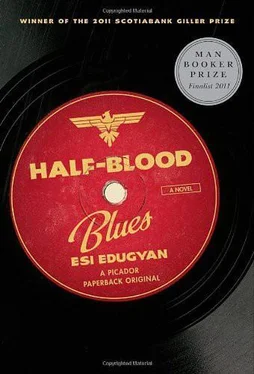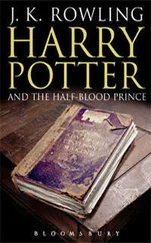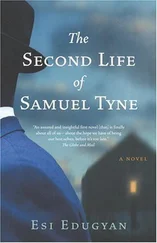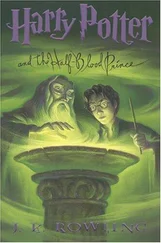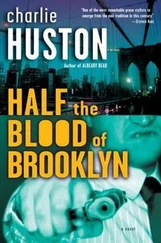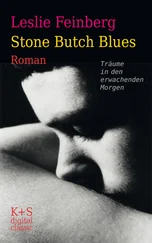He led me into a stone courtyard, vines crawling across a old fountain, the stonework cracked. I followed him through a arched entrance hall, up a long staircase I ain’t encountered before. Fat gilt eagles perched on all the mouldings, their wings crested and fearsome. Every piece of furniture was thin and gold, the walls overhung with mirrors and soft cream curtains. The air smelled of fresh cut lilies.
‘This is the East Wing.’ Ernst smiled bitterly. ‘Our Poland.’
Rummel stood on the landing. He give Ernst a curt nod as we come up. Sour-looking, long-faced, sallow in his black suit, Rummel turned without speaking, leading us along a airy corridor, past tall leaded windows overlooking the gardens. Hiero done told me once bout Charon, that Greek who ferries the dead to the underworld. Rummel, hell, he like our Charon. His eyes was so pale they might’ve been blind.
We come to the study door. Ernst dismissed Rummel, who bowed, turned, and made his noiseless way back down to the landing.
Ernst put a hand on my arm. ‘Sid, my father’s not like other men. He’s very subtle .’
‘Rummel?’ a man called out sharply. ‘Is that you?’
‘Not Rummel,’ Ernst called. He give me a look. ‘Be careful what you say.’
His shoulders tightly set, he opened the door and walked on in.
I followed him. The blue carpet felt thick underfoot. Sunlight from a tall window caught in the folds of drapery, casting long amber shafts across the walls. A small man sat behind a huge dark desk, writing carefully, and he ain’t paused even to look up. His skin looked waxen and pale. His silver-grey suit shimmering in the light from the windows. I seen his cropped grey hair, his fine thin moustache, the etched grooves in his face.
The man lift up his eyes, frowning in displeasure. I lost my breath for a second. His irises — they was a frightening dark blue.
‘Damn it, Ernst, I’m very busy. What is it?’
Ernst sat on the white sofa across from the desk. ‘Nice to see you too.’
His father grimaced, took off his spectacles, held them dangling in one hand. ‘Yes, yes, of course it’s always nice to see you. You’re looking well. Thin, maybe.’
‘I’ve put on weight.’
‘Ah. Not thin, then.’ He glanced back down at the paper in front of him, scratched a few more lines. He looked up, lifted his eyebrows. ‘Well? What is it?’
‘I know you’re busy,’ said Ernst, ‘what with the war you’re starting.’
His father waved a dismissive hand. ‘So dramatic. My goodness.’
‘We’ve come for the documents, Father. For Paris.’
‘Yes.’ Old von Haselberg nodded. His gaze shifted over to me, and I flinched. ‘You must be one of Ernst’s musicians.’
I was still standing foolishly just inside the door, next to the heavy bookcase, its gilt tomes morocco-bound. I swallowed hard, feeling like a damn exhibit just been wheeled out. ‘Sidney Griffiths,’ I said.
‘Of course, yes,’ said von Haselberg. ‘It’s a very peculiar music you boys play.’
‘Sit down, Sid,’ said Ernst, gesturing beside him on the sofa. ‘You don’t need to wait for my father to invite you in.’
‘Where is Rummel?’ von Haselberg asked distractedly.
‘On the landing. Where he always is. Looking like a corpse, I might add.’
‘Yes, poor Rummel,’ von Haselberg smiled. ‘I’ll need him in a moment.’
Ernst said nothing to this.
I watched von Haselberg slide the paper he been writing on into a drawer, locking it. He stood, and taking up his cigar, come round his huge desk. He had that sleek grace his son had inherited, that easy fluidity about him. He took my hand in a firm grip, smiling.
‘What’s my son been telling you about me?’ he said, chuckling. ‘No doubt I must be quite the ogre.’
I shrugged, glanced on over at Ernst. He was frowning, studying the gardens through the big window. In profile, his skin looked near translucent.
When von Haselberg sat, he unbuttoned his suit jacket, stretching his legs out straight.
The old man cast about, looking for a ashtray, then frowned, tapping the ashes onto the carpet. ‘That Frieda. She keeps emptying the ashtrays and then forgetting to put them back. You’d think she was trying to get me to quit.’
‘You should quit, Father,’ said Ernst. ‘It’s a disgusting habit.’
‘Nonsense.’
But Ernst had crossed the carpet, kneeled down, and with a kind of soiled dignity flicked his handkerchief from his breast pocket and palmed up the ashes.
‘Leave it, son, good lord.’ Von Haselberg raised his eyebrows at me, like he was shocked at his son’s foolishness. ‘We do pay the girls for that.’
‘Is that what you pay them for?’
‘Stop it, Ernst. Honestly.’
Ernst pursed his lips, folded the dirty handkerchief back into his pocket.
Old von Haselberg chuckled, his dark blue eyes creasing. ‘You didn’t come here to do chamber service, I assume. Though it doesn’t offend me in the least.’ He looked at me. ‘As long as my son is doing what he loves to do.’ Ernst smiled too. ‘What a remarkable father you are.’
Hell. I start to feeling damn uncomfortable.
But von Haselberg just sort of shrugged a weary shoulder. He ran his small hands along his thighs, like he was growing tired. ‘Mr Griffiths. You’ve been living in the Fasanenstrasse flat? I trust you find it comfortable?’
‘Don’t start on that, Father.’
‘For heaven’s sake ,’ he said, losing some patience. ‘It is called being polite .’
‘This is where he reminds you you’re living off his charity.’
‘Don’t be ridiculous. I meant no such thing.’
Ernst just lifted up his eyebrows, in a exact echo of his father’s earlier gesture.
‘And what do you think of this Poland business?’ said von Haselberg.
‘Don’t answer that,’ said Ernst.
But there was a long silence after that, as if both men was waiting for me to speak. I sort of cleared my throat, glanced over at Ernst. He was studying his shoes. ‘What Poland business?’ I said reluctantly.
Von Haselberg laughed a abrupt, gruff laugh. ‘An excellent answer. Indeed. Where did you say he was from, was it Baltimore?’
‘Baltimore,’ Ernst nodded.
‘Yes, yes. An excellent answer for an American. Can I offer you something to drink?’
‘No,’ said Ernst. ‘We’re fine.’
‘Ah, a pity.’ Still von Haselberg got to his feet, and gliding over to the bookshelves, pulled down a bottle of claret. He poured all three of us glasses, brought them clinking to the side tables beside the sofa.
‘I said no, Father.’
‘Then don’t drink it,’ he said. ‘They aren’t poisoned, I assure you.’ He smiled at me through his cigar. ‘I really do have a deep respect for the arts. All the arts. I don’t think I understand jazz, but I do admire the passion you boys devote to it. Dedication can be genius in its own right.’
I nodded uneasily, turned the glass in my hands.
‘My father is a great patron of the arts,’ said Ernst. ‘Isn’t that what you’re saying?’
The old man sat again with a groan. ‘Not so great, I’m afraid. My work keeps me busy. But it would be a poorer world without them. And I have no illusions, Mr Griffiths. I am an old man, my sense of art is old, but I know that what I love was once rather shocking to the old men then. Mozart, Schiller, Goethe. Paul Hindemith, even.’
‘Oh? Hindemith? Early or later work, Father? I always supposed you to prefer Kurt Eggers or Arno Breker. Hans Pfitzner. Richard Wagner . I underestimated your catholic tastes.’
‘Wagner,’ von Haselberg said, shaking his grey head like he filled with regret. ‘He’s awfully dramatic, isn’t he.’
Читать дальше
